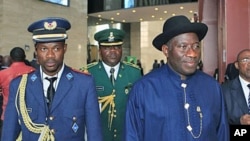Nigerian President Goodluck Jonathan's new government began work this week with many of the same ministers as his previous Cabinet.
Jonathan said Nigerian Cabinet ministers come and go too quickly before some of them even learn how to do their job. So he is returning much of the Cabinet from his previous government.
"For you, I have to congratulate you because there is always a big battle to come back and so for you to have gone through, and have passed through the senate and skirted screening, I congratulate you and we hope you will continue to do the work the way Nigerians expect you to do,” he said.
Powerful ministers return
Those returning include the powerful planning, petroleum and justice ministers.
Kole Shettima, who heads the MacArthur Foundation's Africa office, said Jonathan is looking for continuity.
"It may be there is some wisdom in trying to have some sense of continuity in the program rather than abruptly changing ministers all over again all the time, which sometimes accounts for some of the problems we have, for example in the National Assembly," said Shettima. "Perhaps the abrupt changes that would be brought about as the result of new people might not take us to where we really want to go."
Advocates and detractors
There are still more ministers to be named, but Shettima said the list so far falls short of the ambitious reforms President Jonathan has outlined.
"Those people who have been appointed so far certainly do not give a lot of confidence that we are going to have the people who are going to take this country to the next level of our national development,” said Shettima.
Local chief Mike Ofere says Nigerians have learned to trust Jonathan's decisions, even if they feel that some of the returning ministers did not perform so well the last time.
"Not all of them performed for this return. But because the president considers that they should be returned and he knows why they should be returned, we have no option but to go with our president because he is our president and what he says is final,” he said.
Newspaper editor Onos Oyede said the president has missed an opportunity to bring more professionalism to Nigeria's Cabinet.
"I was expecting that Nigeria would bring technocrats and people who have delivered in the past on board. People who can bring change. People who can disagree with him and tell him: 'President, this is how it should be,'" said Oyede.
Changes and restructuring
President Jonathan is making a change at the Finance Ministry, where he is recruiting the World Bank managing director Ngozi Okonjo-Iweala. She helped negotiate Nigerian debt relief as finance minister in 2005, and is expected to have broader powers over economic management.
Jonathan also is trying to restructure Nigeria's state-run petroleum firm and has promised to create more jobs by investing in infrastructure.
His biggest security concern appears to be a wave of attacks by Islamic militants across northern states, who say they are fighting to establish an independent country under Islamic law.















